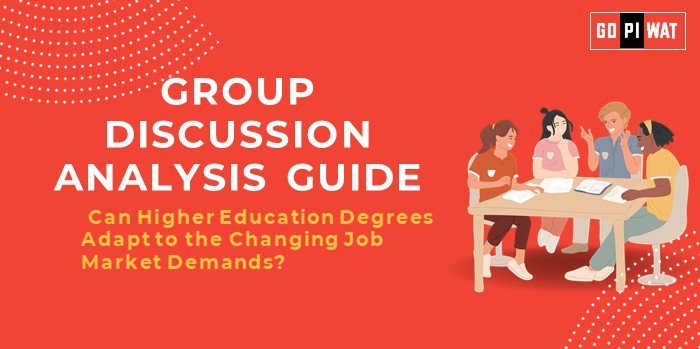📋 Group Discussion Analysis Guide: Can Higher Education Degrees Adapt to the Changing Job Market Demands?
🌐 Introduction to the Topic
- 📍 Opening Context: In today’s rapidly evolving economy, the traditional value of higher education degrees is being questioned as job market demands shift toward skill-based hiring and emerging industries.
- 📜 Topic Background: The industrial revolution of the 19th century established degrees as a measure of competence. However, the 21st-century digital revolution has prioritized adaptability and specialized skills. Automation, artificial intelligence, and globalized industries are redefining job roles, urging higher education institutions to innovate rapidly.
📊 Quick Facts and Key Statistics
- 🌍 World Economic Forum 2023: 44% of workers will need reskilling within five years.
- 📈 McKinsey & Company: 375 million workers globally may need to switch occupational categories by 2030 due to automation.
- 💼 LinkedIn Learning 2024: 60% of hiring managers prioritize skill certification over formal degrees for tech roles.
- 🇮🇳 India’s Skill Gap Report 2023: 54% of graduates are considered unemployable due to skill mismatches.
🤝 Stakeholders and Their Roles
- 🏛️ Governments: Provide policy incentives for curriculum reforms and vocational training.
- 🏫 Higher Education Institutions: Restructure programs to focus on industry-aligned skills.
- 💼 Private Sector: Partner with universities to create industry-specific programs and apprenticeships.
- 🧑🎓 Students: Actively pursue internships, certifications, and alternative learning pathways to gain relevant skills.
🏆 Achievements and Challenges
🌟 Achievements
- 📚 Online Education Growth: Platforms like Coursera, Udemy, and edX democratized learning, reaching over 100 million learners in 2023.
- 🤝 University-Industry Partnerships: IIT Bombay collaborated with Google for AI skill development programs in 2024.
- 🏛️ Government Initiatives: India’s NEP 2020 promotes multidisciplinary approaches and vocational education to enhance employability.
⚠️ Challenges
- 📉 Skill Mismatch: Academic curriculums often lag behind industry requirements by 3-5 years.
- 💰 Economic Barriers: High tuition costs make skill-based courses inaccessible for underprivileged students.
- ⚖️ Resistance to Change: Bureaucratic hurdles slow the process of updating traditional degree structures.
🌍 Global Comparisons
- 🇺🇸 United States: The rise of micro-credentials and coding boot camps (e.g., General Assembly) addresses skill shortages efficiently.
- 🇩🇪 Germany: The apprenticeship model integrates education with practical, hands-on training in industries.
- 🇫🇮 Finland: Adopting modular curriculums has boosted graduate employability by 70%, ensuring adaptability to market demands.
💬 Structured Arguments for Discussion
✅ Supporting Stance
“Higher education institutions must pivot to skill-based learning to remain relevant and increase employability.”
❌ Opposing Stance
“Traditional degrees hold intrinsic value in cultivating critical thinking and foundational knowledge.”
⚖️ Balanced Perspective
“A hybrid model blending theoretical learning with skill-oriented training is essential to meet dynamic job market demands.”
🚀 Effective Discussion Approaches
🔑 Opening Approaches
- 📊 Data-Driven: “With 44% of workers needing reskilling, the current degree system appears insufficient to meet industry demands.”
- 🔀 Contrast Approach: “While Germany excels with apprenticeships, many Indian universities struggle to innovate their curriculums.”
- 💡 Provocative Question: “Can higher education sustain its relevance in an era dominated by technology and automation?”
🤝 Counter-Argument Handling
- 📖 Highlight real-world examples like Finland’s modular curriculums and Germany’s apprenticeship models as effective solutions.
- 🔧 Emphasize adaptive strategies such as AI-driven learning paths and online micro-credentials that blend accessibility with industry relevance.
🔍 SWOT Analysis
- 💪 Strengths: Established education frameworks, global university partnerships, and robust theoretical knowledge.
- ⚠️ Weaknesses: Slow curriculum updates, rising education costs, and limited focus on employable skills.
- ✨ Opportunities: Growth of online platforms, industry collaborations, and AI-driven adaptive curriculums.
- 🚧 Threats: Automation reducing traditional job roles and alternative certifications challenging degree value.
🎓 Connecting with B-School Applications
- 🌍 Real-World Applications: Integration into B-school courses in leadership, entrepreneurship, and education technology.
- 💬 Sample Interview Questions:
- 💡 “How can universities prepare students for industries dominated by AI and automation?”
- 💡 “What role does experiential learning play in modern education, especially in business schools?”
- 🚀 Insights for B-School Students:
- 📊 Understanding shifting industry expectations can help future managers design adaptive education programs.
- ✨ Analyzing education innovation strategies can inform leadership decisions in EdTech and corporate training initiatives.


